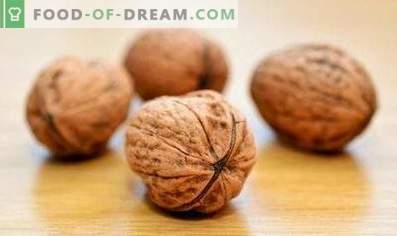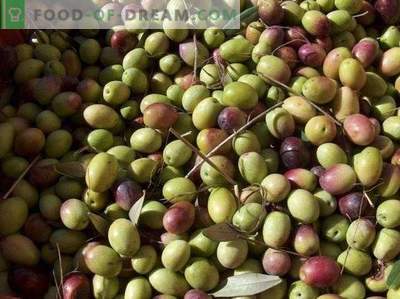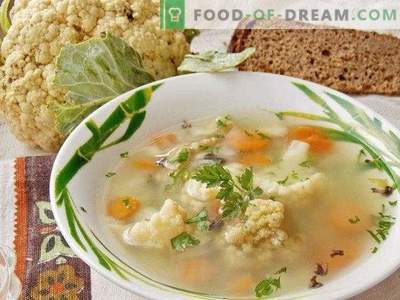The famous physician and chemist of the Renaissance Theophrast Paracelsus rightly called the roots of carrots mandrake, which gave people a long life without disease. The wonderful properties of carrots are in its composition, which includes not only a variety of trace elements, but also contains a rich set of vitamins, some of which are not formed by the human body as a result of metabolic processes. Carrots concentrate in their root crop substances that contribute to the cure of many diseases, the acquisition of sustainable immunity and rejuvenation of the body as a whole. Read more about the beneficial properties of carrots, the biochemical composition and the effect of growing conditions on the value of root crops in this material.
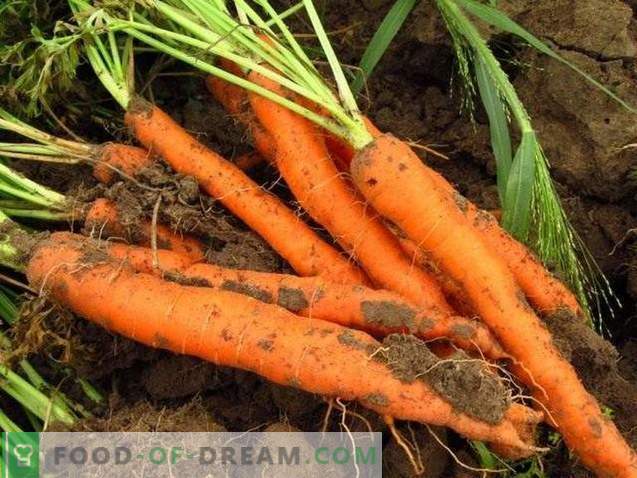
Some facts about carrots
Cultural forms of carrots are descended from the wild, in many growing in Asia and Europe. Afghanistan is considered the birthplace of the root crop.
The first mention of carrots belong to the 10th century BC. e. Cultivation of carrots, thanks to the treatises of the first healers who wrote about its benefits for the body, began more than 3 thousand years ago. In Europe, including Russia, carrots were cultivated in the 14th century. The roots of those years, and almost before the start of breeding work in Western Europe in the 19th century (in Russia at 20), were predominantly white, red and even purple, contained few vitamins, the flesh was coarse and fibrous.
It should be noted that in natural conditions, the content and list of useful properties of carrots root differ from the cultivated forms, when, as a result of selection, the useful properties of this crop develop purposefully.
Only in the 20th century, as a result of breeding, varieties of carotene carrots, which are usual for us, appeared, mostly orange flowers, sweet, with pleasant juicy pulp. If before breeding in culinary, they used mainly tops and carrot seeds, and root crops were much less frequent, then a real culinary boom occurred later. Cookbooks have devoted significant amounts to the descriptions of various recipes for the preparation of carrot root vegetables in combination with other food crops, and medical reference books to recipes for the preparation of medicines for various diseases.

The effect of growing carrots on the quality of root vegetables
The value of carrots is determined by the content of vitamins and other nutrients that accumulate in the root. Their quantity and quality depend on the cultivation technology. In case of violation of agrotechnical requirements, not only external signs change (small, little orange, cracked root crops, etc.), but also their biochemical parameters. The content of vitamins, flavonoids, anthocyanides and other compounds that are very important for the body is sharply reduced.
Carrots - a culture of temperate climate. Demanding on the basic living conditions: soil and temperature conditions, the provision of moisture and light. When poorly prepared soil (low friability and insufficient filling with basic fertilizers), insufficient watering and dressing during the growing season, disturbing the ratio of basic nutrients (plenty of nitrogen and little potassium) and other conditions, the quality of the root crop decreases.
Buying root vegetables on the market, be sure to inquire about the conditions of cultivation. But it is best to maintain carrots on your own plot to maintain the health of family members, while complying with all the requirements of agricultural cultivation. At the same time, sowing should be carried out only by zoned varieties and hybrids. In the winter period in your garden diary make a list of early, medium, late varieties with the highest biotechnical indicators of product quality and collect carrot seeds of these very varieties.
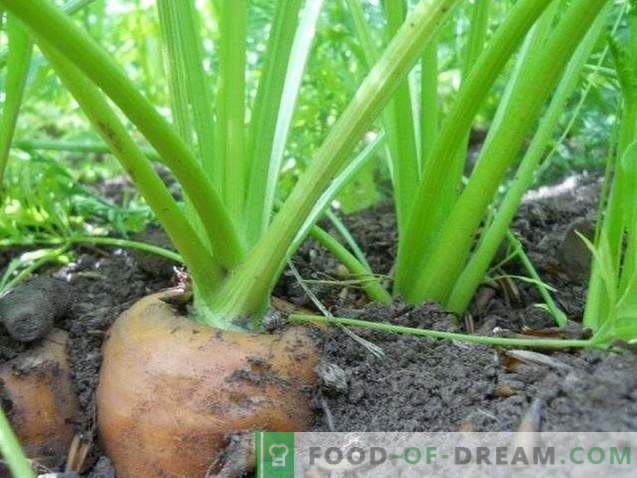
Biochemical composition of carrots
Vitamins in carrots
- Carrots contain 22% provitamin A (carotene), including alpha and beta carotenes, which are synthesized in the body into vitamin A, which is responsible for visual acuity.
- Vitamins of the “B” group in 100 g of carrots contain more than 0.5 g, including B1, B2, B3, B5, B6, B9 and B12, which are necessary for the body to synthesize hemoglobin.
- The carrot juice contains a group of active chemicals, calciferols, presented in the form of vitamin “D”, including “D2”, “D3”. Vitamin “D” under the influence of natural solar and ultraviolet (artificial irradiation) rays can be produced in the body, manifesting itself as a tan. Its deficiency in the body in children is manifested in the form of rickets, and in adults - in the form of osteoporosis (fragility) and softening (osteomalacia) of the bones.
- The carrot has a high (11%) vitamin K content, which regulates blood clotting, preventing blood clots.
- Vitamins “C” and “E” provide the body with energy and normalize the functions of the endocrine glands. In addition, vitamin “E” slows the aging process. It is called the vitamin of youth. It is indispensable for diabetics, as it helps reduce the need for insulin.
- Vitamin “PP” (niacin), like previous vitamins, provides energy to the body, supports heart function, blood circulation, and participates in the exchange of amino acids.
- Vitamin “N”, or lipoic acid regulates the functioning of the liver, thyroid gland, participates in carbohydrate metabolism, affects the level of cholesterol in the blood.
The entire vitamin complex is stored in freshly prepared carrot juice for an hour. When defrosting - within 0, 5 hours. The most complete use of its body occurs in the presence of fats (butter, sour cream).

Trace elements with carrots
Distinguished carrots and a fairly high content of trace elements. 100 g of raw carrot contains 320 mg of potassium, which is responsible for the normalization of the heart. In Soviet times, potassium orotat was assigned to runner athletes. The concentration of sodium varies between 69-70 mg, and the amount of phosphorus and calcium exceeds 65-68 mg. Copper, zinc, iron, magnesium, manganese, cobalt and molybdenum are present in sufficient quantities in the carrot root crop.
In carrots there is also selenium - an element of youth and fluorine, which is responsible for the functioning of the thyroid gland, and promotes the elimination of heavy metals and radionuclides from the body.
There are other elements in the root crop, in the compounds and combinations necessary for the normalization of water metabolism (chlorine), water-salt metabolism (sodium), protein composition (sulfur). Complement the list of trace elements aluminum, boron, vanadium, nickel, chromium, lithium, iodine.
An impressive list on the background of low calorie foods becomes indispensable in the treatment of obesity, weight loss, stimulation of blood formation.
Carrots are part of all fitness diets. 100 g of root vegetables (one small carrot) contain from 35 to 40 kcal, but more than 9, 5 g of carbohydrates, 2, 8 g of dietary fiber.
Other beneficial substances in carrots
Recently, there has been a general decline in immunity in children and adults, and attacks of colds are intensifying. Carrots in their phytoncidal properties are almost equivalent to garlic and onions, but have no unpleasant smell. On the contrary, essential oils add zest to the food being produced. At the beginning of the recognition of carrots food product used in the preparation of dishes, as already mentioned, the seeds and green tops. In smaller concentrations than in other vegetables, but in a more complete list of amino acids are present in carrots. Their list includes tyrosine, lysine, leucine, ornithine, cysteine, asparagine, threonine, histidine, methionine, and others.
Anthocyanidins and bioflavonoids give carrots a pleasant rich color. It includes umbelliferone, which takes part in the biosynthesis of such irreplaceable compounds as phytosterols, coumarins, quercetins, cellulose, pectins, sugar, etc.
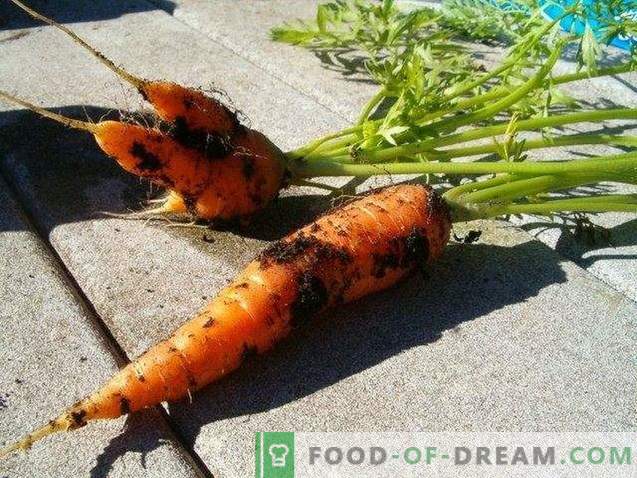
Useful properties of carrots
For the treatment and prevention of diseases carrots are used in the form of a raw product, boiled, frozen after thawing. When boiled, it enhances the positive effects on the body in the treatment of nephritis, cancer, diabetes, and general dysbiosis. Crude carrots prevent microbial infection in the oral cavity and in the whole organism in case of infectious colds (ARI, flu).
Carrots are used for avitaminosis, anemia, atherosclerosis. It is included in the compositions for the treatment of Alzheimer's disease, gastrointestinal tract, helminthic invasions, gallstone and urolithiasis, pyelonephritis, cystitis. Effective carrot juices for conjunctivitis, night blindness, and other eye diseases. Used in official and traditional medicine for diseases of the bone and hematopoietic system.
50 g per day of fresh carrots (average daily rate) will reduce the risk of stroke by 60-70%, malignant breast tumors by 25%, and diseases of the retina with visual impairment by 40%.
Contraindications for eating carrots
- Carrots are not recommended for allergies to this product.
- In inflammation of the gastrointestinal tract, small intestine, gastric ulcer. In these cases, the vegetable is used boiled or stewed.
- For liver diseases, consult your doctor before using carrots.
- With excessive consumption of raw carrots and juices, yellowing of the feet and skin of children and adults may be observed. It is necessary to reduce the daily dosage of the product, until the yellowness does not come down.
In conclusion, I want to warn readers. Carrots are very useful, but in all the measure is needed. It is enough to eat 1-2 carrots per day, not exceeding 100-120 g in any form - salads, mashed potatoes, juices.

